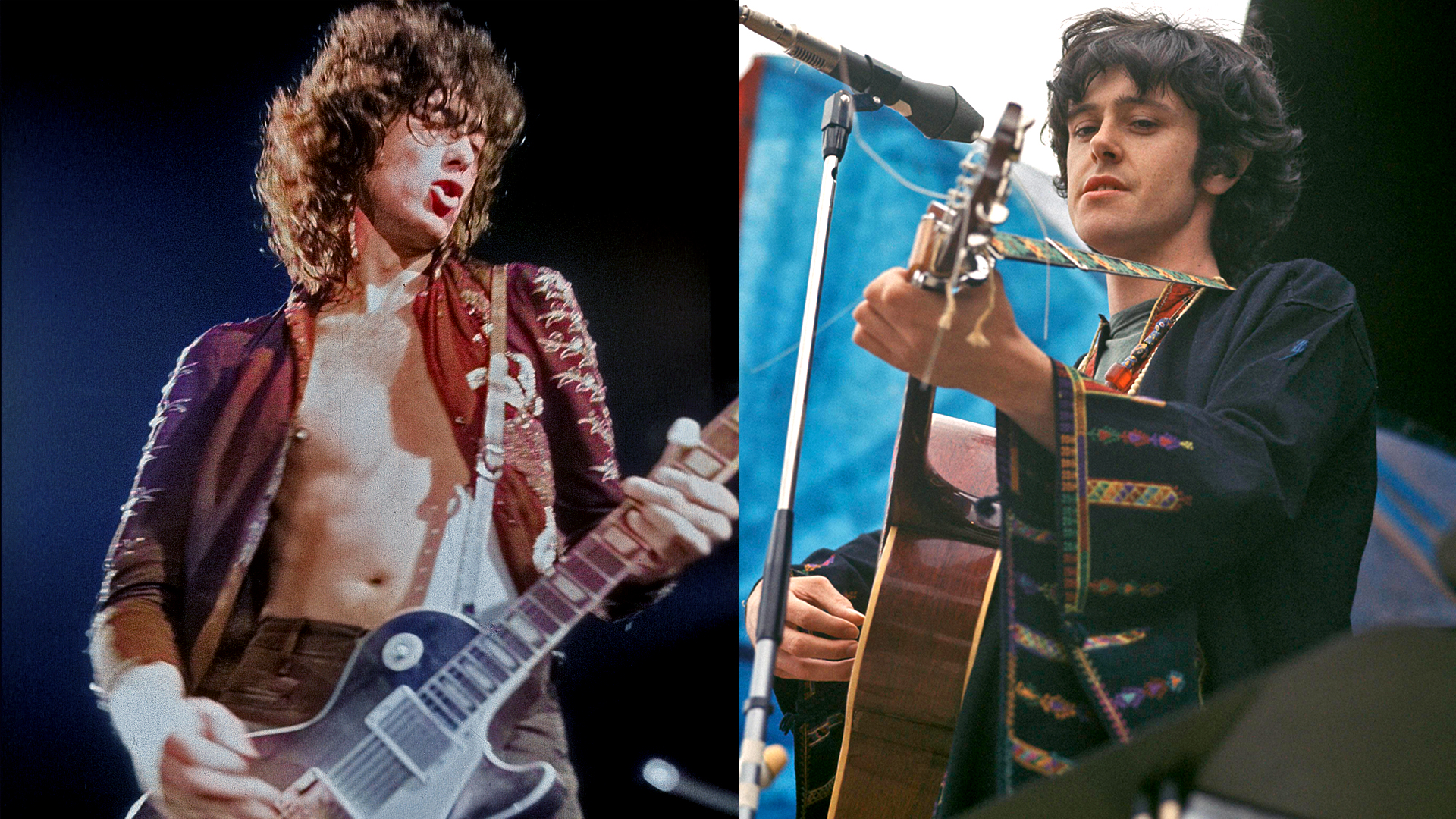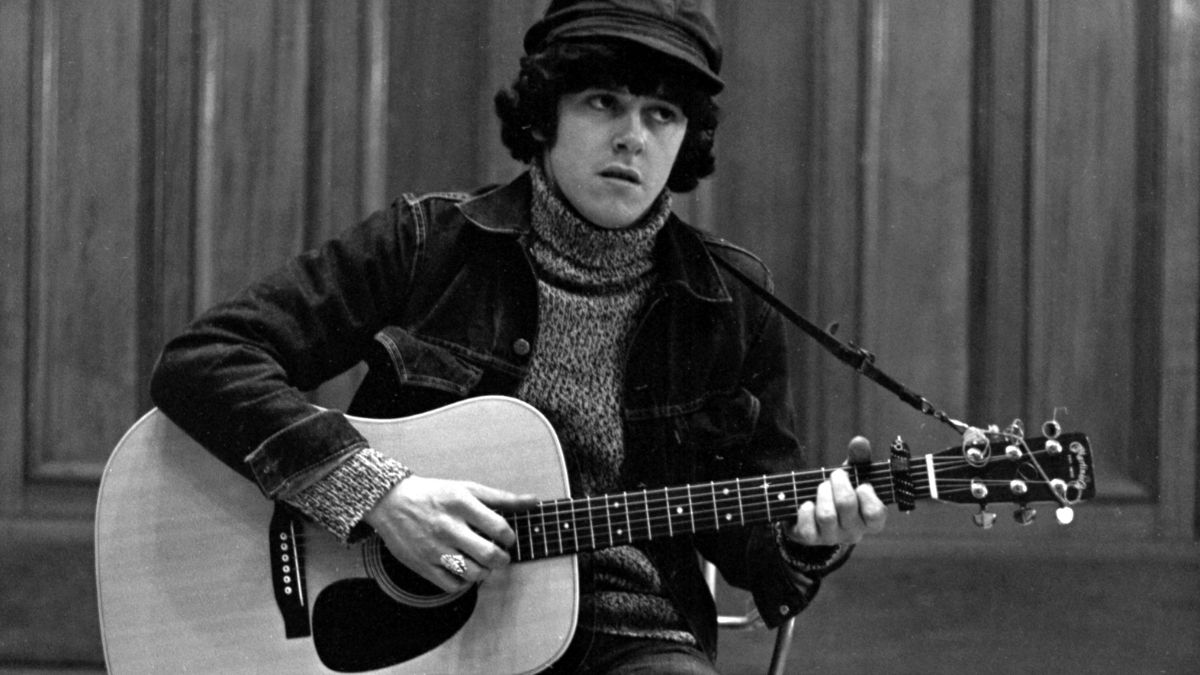“Is it possible that this anticipated heavy metal?” Donovan says he, Jimmy Page and John Paul Jones sowed the seeds for Led Zeppelin and the future of hard rock with this 1968 hit song
Two Led Zeppelin greats played on the Scottish folk singer's hit. He claims it had a lasting impact on music

All the latest guitar news, interviews, lessons, reviews, deals and more, direct to your inbox!
You are now subscribed
Your newsletter sign-up was successful
Did a Scottish folk-singer lay the groundwork for one of music's defining heavy rock acts?
Donovan thinks so. Speaking in a new interview, the 79-year-old musician claims he helped create Led Zeppelin with his 1968 hit "Hurdy Gurdy Man," thereby setting in motion the creation of hard rock and, subsequently, heavy metal.
Released in May 1968, "Hurdy Gurdy Man" was quite a departure for the folk guitarist. Although Donovan started his career in 1965 as a British version of Bob Dylan in his folk period, he soon took a more baroque/psychedelic approach to his folk and began incorporating Eastern instruments as well, including tamboura.
But "Hurdy Gurdy Man" was something altogether different — heavier, almost menacing. It was hard to tell if the titular character was kindly or demonic. And much of that has to do with the musical performance, which is built on a grooving melodic bass guitar line, thundering drums and heavily fuzzed electric guitar leads.
In short, it sounds a lot like Led Zeppelin.
For that matter, Donovan already had a history with two of that group's future members. Jimmy Page and John Paul Jones both performed on his 1966 hit "Sunshine Superman"; Page also played on "Epistle to Dippy," while Jones appeared on "Mellow Yellow."
As Donovan explains it, one year after Page and Jones appeared — for at least the second time ever — on "Hurdy Gurdy Man," the duo would form Led Zeppelin with singer Robert Plant and drummer John Bonham.
All the latest guitar news, interviews, lessons, reviews, deals and more, direct to your inbox!
“John Paul Jones and Jimmy Page were very strong session guys for me,” Donovan tells The Telegraph. “At that period when ‘Hurdy Gurdy Man’ was released, that’s when those two guys put the band together.
“Is it possible that this anticipated heavy metal?” Donovan asks. He seems to think so. “After that came Black Sabbath, and after that came Deep Purple.”
The song's history is steeped in musical majesty. Donovan wrote “Hurdy Gurdy Man” while in Rishikesh, India, where he'd accompanied the Beatles on a spiritual sojourn to study Transcendental Meditation. The Beatles returned home with a cluster of new music for their 1968 White Album, while Donovan drew his own sonic inspirations from the trip.
In particular, he says he began writing "Hurdy Gurdy Man" on the tambura after George Harrison — who introduced sitar to rock music on the Beatles' "Norwegian Wood" — taught him sitar scales he learned from sitar master Ravi Shankar.
For the recording, Donovan turned to Jones, who was then a session musician. Jones was tasked with hiring the musicians, and while he reportedly claims Alan Parker played guitar and Clem Cattini performed drums, Page attests that he played guitar on the track alongside Jones and future Zeppelin drummer John Bonham. (For the record, Eddie Kramer, the song's engineer, confirms Page played on the song but says Cattini, not Bonham, is on drums.)

Donovan remains coy about his influence in the grand scheme of things. Indeed, he does not “want to say I created Led Zeppelin,” but he believes “John Paul Jones saw the possibilities” while they were committing the track to tape.
He may or may not have inadvertently helped sow the seeds for heavy metal, but what is indisputable is his wider influence on the guitar-playing community.
As he revealed another recent interview, a legendary prog-rock guitarist told him he bought his former cottage because “you wrote all those bloody songs there.”
Remarkably, Page wasn't Donovan's first choice for "Hurdy Gurdy Man." It was Jimi Hendrix, whom he had seen perform at the London club Bag O'Nails in his debut performance with the Experience.
“Everyone was there: the Stones, the Beatles, the Who, the Kinks. Chas [Chandler, Hendrix’s manager] had invited everyone,” Donovan tells Classic Rock. “And it was quite incredible. Such a superb blend of musicians.
“I didn’t see him much after that because we all went on the road and we all got famous and our paths only crossed occasionally. But when I wrote ‘Hurdy Gurdy Man’ I thought of Jimi. I said to [producer] Mickie Most: ‘This is for Hendrix… Let’s get Hendrix to play on it.’”
Hendrix’s relentless touring schedule meant Page got the gig instead. And Donovan got a heck of a story to tell for the rest of his career.
A freelance writer with a penchant for music that gets weird, Phil is a regular contributor to Prog, Guitar World, and Total Guitar magazines and is especially keen on shining a light on unknown artists. Outside of the journalism realm, you can find him writing angular riffs in progressive metal band, Prognosis, in which he slings an 8-string Strandberg Boden Original, churning that low string through a variety of tunings. He's also a published author and is currently penning his debut novel which chucks fantasy, mythology and humanity into a great big melting pot.


